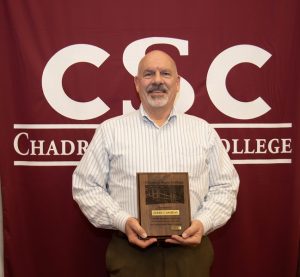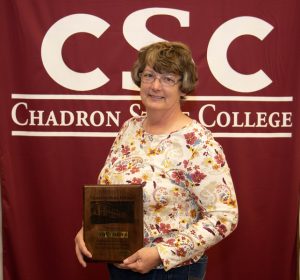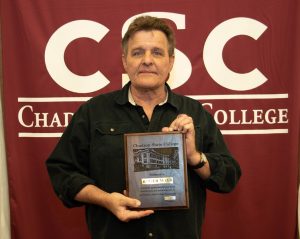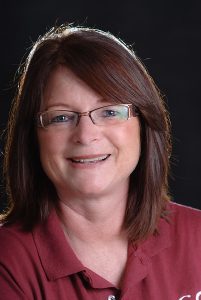By CSC College Relations
CHADRON – The annual Chadron State College Faculty and Staff Recognition Luncheon Tuesday included special acknowledgement of six employees who have or will retire during the 2018-19. They are Jerry Cassiday, Amy Coates, Don Keiper, Dr. Robert Knight, Roger Mays, and Patti Porras.
Jerry Cassiday
The greatest feelings of accomplishment as a licensed student counselor at Chadron State College, said Jerry Cassiday, arose from the sense that a student who had come in for help left the office in a better state of mind.

“It was day-to-day successes,” said Cassiday, who is retiring from a 17-year career with CSC at the end of this semester.
Cassiday, who was born in Washington, grew up mostly in several different Nebraska communities while his father was a minister with the United Church of Christ. He earned his undergraduate degree in philosophy/religion from Doane College, and followed in his father’s footsteps, serving as a UCC minister for 17 years, including 12 years at First Congregational Church in Chadron.
After deciding it was time for a career change, Cassiday enrolled in the master’s program in counseling at CSC and was hired as student counselor after completing the degree in 2002.
One of two licensed student counselors serving the general population at CSC, Cassiday said his primary responsibility was, as the job title suggests, providing personal counseling for students.
“College students have a particular set of problems that can be addressed with counseling, not the least of which is homesickness,” he said.
He also encountered students with mental health issues, including some with problems that predated their enrollment in college, he said.
While first year students might seem to be most prone to issues that need counseling services, that wasn’t always the case, according to Cassiday.
“There was an ebb and flow to it,” he said. “Each incoming class seemed to have its own personality.”
Over the years, the type of problems affecting college students has changed, and the number of students needing counseling services has increased, said Cassiday.
“For a long time, depression was the number one mental health problem that college students reported across the country, but in recent years, anxiety eclipsed depression.”
Cassiday also served as disability services contact for the college for 15 years. The job involved arranging accommodations, primarily in classrooms, for students with documented disabilities and it also changed over time, said Cassiday.
“The number did increase over the years, because of awareness and more and more diagnoses of learning disabilities and physical disabilities,” he said. “And sometimes there were dietary disabilities that needed adjustments in the dining hall.”
Having a chance to help students individually was the best part of working at CSC for Cassiday.
“I feel it was a privilege to be able to work with students who were, to a degree, suffering and help them manage that and get through it and get well and get on with their lives,” he said.
Cassiday and his wife, Cheryl, who is retired after serving as head of nursing at Chadron Community Hospital for many years, have three children, Andrew, Rachael and Christopher, and five grandchildren. His retirement plans include what he calls grandparent patrol and working on a list of woodworking projects that he has been waiting for free time to tackle.
Amy Coates
Amy Coates will retire at the end of May after working in every building on the Chadron State College campus since she was hired by the custodial department in January 1998.

Initially, she worked in the Kline Center and the Media Center, now the Mari Sandoz High Plains Heritage Center, for two years. While the Media Center underwent renovation, including the addition of the Chicoine Atrium, she continued to clean the Kline Center before it was demolished.
Coates worked with others in the custodial department following the 2007-10 renovation of Old Admin to prepare it for the return of employees who had temporarily been relocated to other buildings.
When Coates was assigned to Sparks Hall in 2009, she said it felt like home because she was again working with the Alumni and Foundation staff who moved to Sparks after Kline closed.
“You build a relationship with people. That’s going to be hard to leave. The relationships I’ve built through the years, I’ll maintain those,” she said.
Maintenance Manager Todd Baumann, said Coates’ skills have made her a valuable employee.
“She’s willing to help out. She knows her job and does a good job,” he said. “She’s conscientious and has a lot of knowledge. She’s flexible. She can go whenever, wherever we need her, which is a great quality. Amy has been an important part of the custodial department.”
Although the campus was quiet and peaceful at 5 a.m. when she arrived at work, she won’t miss clearing the snow in the cold weather.
Coates recalls the July 2006 fire south of campus created some unique cleaning challenges.
“I remember the soot swirls on the floor. We did a complete wash of the dorm walls after the fire due to the amount of soot,” Coates said.
Retirement plans for Coates include spending time with her husband, John, and their grandchildren in Gillette, Wyoming, and the Sioux Falls, South Dakota, area. The couple also plans to go camping and travel. Her list of hobbies includes gardening, sewing crafts, mending, spending time with friends, and serving her church.
Don Keiper
Don Keiper retired in January 2019 after 23 years at Chadron State College. He became the Director of Security in 2010 after two years as Security Supervisor and 13 years as a part-time Security Officer. His responsibilities included supervising and scheduling staff and coordinating coverage of major events with the Chadron Police Department.

CSC Security was the Sidney, Nebraska, native’s second career after retiring from the Nebraska State Patrol in 1994. He spent 26 years with that agency, 22 in traffic operations and four as a criminal investigator.
“I’ve been lucky I’ve spent my whole career in Chadron,” Keiper said.
Keiper said two major projects stand out during the past few years at CSC. He spent two years writing and fine tuning campus lockdown procedures and protocols with Brenda Barry-Schommer and managed the installation of more than 220 campus cameras with Ann Burk, chief information officer.
His retirement plans include the Sturgis Rally in South Dakota since he hasn’t missed one since 1962. Motorcycle travels that will take him and his wife, Margaret, farther away include completing a bucket list trip to drive through the lower 48 states on their motorcycles. Their final four destinations are: Maine, Vermont, Louisiana and Florida.
Keiper has two sons and Margaret has one son and two daughters. Together, the couple have 19 grandchildren and 10 great grandchildren in Nebraska, Rapid City, and Chicago.
At 74, Keiper said he is in good health, having survived a quadruple bypass in 2000, facial cancer, and a ruptured appendix in 2008.
He also wants to write another novel chronicling the life of a former Vietnam War-era Marine known for vigilante justice, McAlister.
Although Keiper’s first novel, “McAlister: Fire in the Desert,” was not suitable for his granddaughter, Miranda, in Grand Island, she asked him if they could write a book together, a request he thought as a passing fancy.
“I didn’t think much of it at the time, since she was only 12, but six months later she sent me 300 pages of her ideas,” Keiper said. “I helped her organize her thoughts and develop the characters and plot.”
They published the novel “Twisted Fortune,” when Miranda was about 13. Keiper would like to eventually collaborate on another book with her.
Keiper’s other novels include “McAlister: Steel Street Agenda,” published in 2014, and “McAlister Not In My House,” published in 2017.
Robert Knight
As a teenager growing up in San Diego, just a 15-minute drive from Mexico, Social Sciences Professor Dr. Robert Knight said he became curious about the systems of government that gave rise to the stark differences in living conditions he observed on occasional visits across the border.

That curiosity led Knight, who is retiring in May, to study political science at San Diego State University where he graduated in 1972. He went on to earn a master’s degree in the subject from the University of California Davis a short while later.
Knight’s master’s degree qualified him for political science teaching jobs in community colleges in the San Diego area and he found he enjoyed teaching. But a doctorate was required to fulfill his goal of teaching in a four-year institution, so he enrolled in graduate school at Claremont Graduate University.
Combining studies with part-time teaching work at several colleges in the region was difficult, Knight said.
“I was commuting from one institution to another,” he said. “I didn’t have time for anything else. I was working constantly.”
After completing his PhD, Knight took the post at Chadron State in 2008. Over the past 11 years, he has taught a variety of courses, including introduction to political science, U.S. politics and government, American political thought, politics and religion, and international politics.
“Pretty much the gamut of political science courses,” he said. “Teaching at an institution like this, you have to basically cover everything.”
Comparative legislative politics, with a focus on the legislative process in Mexico, is Knight’s specialty and the focus of his research work, but he said teaching a variety of political science courses has been interesting, and perhaps more useful than the hyper specialization required of professors in larger institutions.
“They become so specialized, it becomes esoteric,” Knight said. “Some of the best academics are ones that can draw from other fields and bring it in.”
Getting students interested in the mechanics of government can be a challenge, according to Knight.
“I think students tend to be turned off by politics. It’s understandable, but it’s unfortunate,” he said.
To counteract those feelings, Knight said he starts by discussing the essentials of human conduct and explaining why government has to play at least a minimal role in protecting people’s rights and insuring their security.
“You can build from there to what else government can do,” he said. Knight said he has enjoyed his time at CSC.
“I have had great colleagues here in our department that I have worked with. It’s really been a great environment,” he said. “And we have some outstanding students that are really quite sharp and quite dedicated. It’s been really a pleasure to work with a lot of them.”
At the end of the semester Knight and his wife, Louise, will be moving back to San Diego, where they still have a house and their daughter lives. He’s planning to play golf, do lots of reading, travel both in the U.S. and internationally, and indulge in his passion for fishing.
Knight hopes to continue teaching as well, but on a limited basis, at one of the many higher education institutions in the San Diego area.
“What I’d like to do is teach comparative politics because that’s my specialty, and particularly Latin American politics,” he said. “I’d like to teach one or two classes a semester to keep engaged.”
Moving back to California means leaving the friendly people, lack of traffic and small town atmosphere of Chadron, said Knight, but there’s one thing he won’t miss in southern California.
“There’s no snow to shovel. That’s an advantage,” he said.
Roger Mays
Roger Mays clearly recalls his first foray into the world of theatre: As a high school student in Doniphan, Nebraska, the school librarian asked him to take a part in a one-act play that had just two actors. Mays recruited his best friend for the other part, rehearsed diligently, and found success with the show in a theatre competition at Doane College.

“We won best play, best actor, and best actress,” said Mays, who is retiring in May after 20 years as Professor of Theatre at Chadron State College. “I got hooked on theatre.”
Success in that first high school play landed Mays a scholarship to the University of Nebraska-Kearney, where he studied for a theatre degree, acted in 13 shows and had a work-study position in the department’s set shop.
Later, Mays took a job with the Georgia Shakespeare Festival in Atlanta at Oglethorpe University where he later took a teaching position.
A stint as musician and actor with the Montana Repertory Theatre in Missoula followed, where Mays earned membership in the Actors Equity Association, the century-old union representing professional actors and stage managers in the U.S. Returning to Georgia, where his wife, Lucinda, was working as horticulturist at the Callaway Gardens, Mays became production manager at the Springer Opera House, an 1872 building that houses the state theatre of Georgia.
A desire to return to teaching surfaced a few years later, so he entered the MFA program at the University of Georgia. In the summer of 1998, he moved to Chadron.
Mays’ breadth of theatre experience has been valuable during his two decades at CSC, where he has taught diverse courses including acting, makeup, acting for the camera, directing, and children’s theatre.
The CSC theatre department has staged four shows each year since Mays arrived, and photo collages from each production adorn the hallway walls outside his second floor office in Memorial Hall. Mays said he can recall details from every one of the shows.
He looks back with pride at the 10 years he spent working with the Post Playhouse at Fort Robinson State Park, where he directed plays, ran the box office, and helped raise the level of professionalism of the popular summer theatre company.
Starting a children’s theatre workshop at CSC is another contribution to the community from Mays’ tenure.
The touring production course is only offered every three years, but Mays has also collaborated with the Chadron Public Library Foundation to provide a free show for younger students every year.
The Pine Ridge Job Corps Center south of Chadron has also benefitted from CSC’s theatre outreach efforts.
“We always have Job Corps come for a preview of every show we have ever done. They have a free show and we have a preview audience,” he said. “That’s been going on for 15 years. That’s a real fond memory of mine.”
Mays said the students he has worked with top the list of his favorite memories of working at CSC, and he particularly enjoyed advising those who are the first in their family to attend college.
Watching CSC students take that advice and go on to successful careers that include theatre work, Mays said he’s pleased with the results.
Retirement plans for Mays include staying in Chadron for at least a few years while Lucinda continues her horticultural work as CSC grounds supervisor, continued activity with the Campus Arboretum Volunteers and plenty of fishing.
Patti Porras
Patti Porras enjoyed the customer service aspect of working in Chadron State College’s Business Office for 20 years. She was hired in July 1998 and retired in October 2018.

“I enjoyed working there and I learned a lot. I’ll miss the students and my colleagues,” said Porras, who had five supervisors over the years.
As an Accounting Clerk II, she said she built a lot of friendships while helping parents.
“It was my goal to turn their fears into a positive experience, whether they were worried about money, saying ‘goodbye’ to their child, or both,” she said.
Porras said she received several thank you notes and some flowers from parents thanking her for going the extra mile.
Office relocations were part of the job, she said. Porras started when the Business Office was in Old Admin. Then, the office was temporarily housed in Sparks Hall’s Conference Room until its space was ready in Crites Hall following a renovation. One more move took the Business Office from the south side of the Crites Hall main lobby to its current location on the north side.
Adjusting to online payments and other computer-based changes over the years were also part of Porras’ tenure.
The timing of retirement has worked out well for her family responsibilities. Her widowed mother, Bobbi Ross, experienced health problems just a week after Porras retired and is now mostly homebound. Porras is grateful for the extra time she has to assist her mother.
“Things happen for a reason. It’s amazing how God works,” Porras said. “My goal is to help her be able to live at home for as long as possible.”
In addition to caring for her mother, Porras’ husband, Edmond, has parents who are both in their 90s. Her father-in-law lives at Prairie Pines and her mother-in-law is a resident at Crest View Care Center.
Porras is planning for a future hip replacement that will eventually allow her to return to gardening, camping and become more involved in civic organizations and volunteer work.
“It will be nice to have the summers off,” she said.
She recently returned from a trip to Dallas with her daughter Mackenzie Suko. They visited Porras’ son, Riley Nemeth, and his wife, Krista, and visited historical sites including a marker that honors Porras’ great-great-grandfather, Col. James Ross, one of Stephen F. Austin’s Old 300, a group of original Texas settlers who received land grants from Spain.
